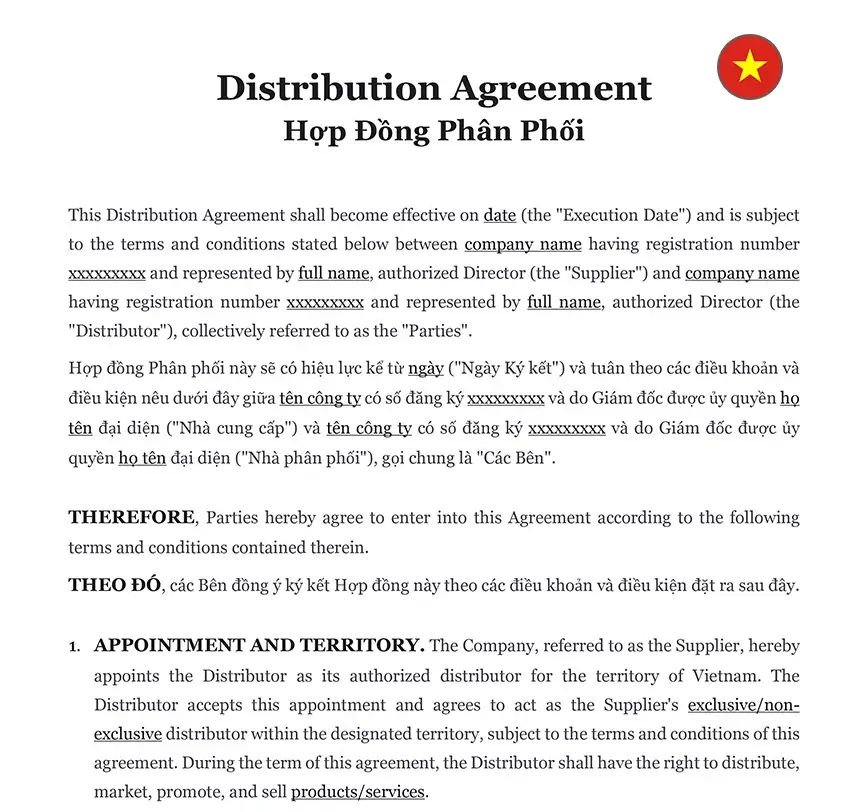Ready to use legal template
Drafted by experienced lawyers
Vietnamese-English translation
Ready to use legal template
Drafted by lawyers
Vietnamese-English translation
Home › Business contracts › Distribution Agreement
Learn more about Distribution Agreement in Vietnam
A Distribution Agreement is a legally binding contract between a supplier or manufacturer of goods and a distributor who will sell or distribute those goods. It outlines the terms and conditions of the distribution relationship, including the rights and responsibilities of both parties. At Themis Partner, we offer a professionally drafted Distribution Agreement tailored to the legal requirements in Vietnam. Our agreement is provided in an easy-to-edit Word format, ensuring that it can be customized to suit the specific needs of your distribution arrangement while remaining compliant with Vietnamese law.
Table of contents
What is a Distribution Agreement?
What is included in a Distribution Agreement?
What are the advantages of having a Distribution Agreement?
How are intellectual property rights handled in Vietnam?
What is the difference between Supply and Distribution Agreement?
Are there any restrictions on the territory covered by a Distribution Agreement?
What happens if there is a breach of contract in a Distribution Agreement?
How do you terminate a Distribution Agreement?
What is a Distribution Agreement?
A Distribution Agreement is a legally binding contract between a supplier (often a manufacturer or wholesaler) and a distributor who agrees to market, sell, or distribute the supplier’s products within a specified geographic area or market segment. This agreement defines the terms of the relationship, including the rights and responsibilities of each party. It typically includes provisions related to the scope of the distribution rights, pricing and payment terms, marketing and promotional support, product quality standards, intellectual property rights, confidentiality obligations, and dispute resolution procedures.
In Vietnam, a Distribution Agreement must comply with the country’s laws and regulations governing commercial contracts. These agreements are often used by businesses to expand their reach into new markets or to efficiently distribute their products through established distribution networks. By clearly outlining the terms of the distribution relationship, a well-drafted Distribution Agreement can help prevent misunderstandings and disputes between the parties involved.
What is included in a Distribution Agreement?
A Distribution Agreement typically includes several key provisions to outline the terms of the distribution relationship. These provisions may vary depending on the nature of the agreement and the parties involved, but they commonly include:
1. Parties
Identification of the supplier (often referred to as the “manufacturer” or “supplier”) and the distributor, including their contact details and legal entities.
2. Scope of Distribution Rights
Specification of the geographic territory or market segment where the distributor has the right to distribute the products. This section may also include any exclusivity arrangements, where the distributor is the sole distributor of the products in the specified territory.
3. Products
Description of the products that are subject to the distribution agreement, including any specifications, models, or variations.
4. Term and Termination
The duration of the agreement and the conditions under which either party can terminate the agreement, such as for breach of contract or non-performance.
5. Price and Payment Terms
The pricing structure for the products, including any discounts, rebates, or commissions payable to the distributor. This section also specifies the payment terms, such as the frequency and method of payment.
6. Marketing and Promotion
Obligations of both parties regarding marketing and promotional activities for the products, including any required approvals or coordination.
7. Intellectual Property Rights
Protection of intellectual property rights related to the products, including trademarks, patents, and copyrights.
8. Confidentiality
Obligations of both parties to keep confidential information confidential, including trade secrets, pricing information, and customer lists.
9. Indemnification
Responsibilities of each party for any claims, damages, or losses arising from the distribution of the products.
10. Dispute Resolution
Procedures for resolving disputes between the parties, such as through negotiation, mediation, or arbitration. These provisions are intended to protect the interests of both parties and ensure that the distribution relationship is conducted smoothly and in accordance with applicable laws and regulations.
What are the advantages of having a Distribution Agreement?
Having a Distribution Agreement offers several advantages for both the supplier and the distributor.
For the supplier, a Distribution Agreement provides a structured framework for expanding their market reach without having to establish their own distribution network. It allows them to leverage the distributor’s existing infrastructure, expertise, and market knowledge to increase sales and market share.
For the distributor, a Distribution Agreement provides access to a range of products that they can market and sell without the need to develop or manufacture the products themselves. It can also provide exclusivity in a particular geographic area or market segment, giving the distributor a competitive advantage.
A well-drafted Distribution Agreement can help clarify the rights and responsibilities of both parties, reduce the risk of disputes, and provide a solid foundation for a successful distribution relationship.
How are intellectual property rights handled in Vietnam?
In Vietnam, intellectual property rights (IPR) in a Distribution Agreement are typically handled through provisions that protect the supplier’s IP rights related to the products being distributed. These provisions may include:
| ➤ Ownership: Clarifying that the supplier retains ownership of all intellectual property rights related to the products, including trademarks, patents, copyrights, and trade secrets. |
| ➤ License: Granting the distributor a limited, non-exclusive license to use the supplier's intellectual property rights solely for the purpose of distributing the products in the specified territory or market segment. |
| ➤ Restrictions: Imposing restrictions on the distributor's use of the supplier's intellectual property rights, such as prohibiting the distributor from using the IP rights for any purpose other than distributing the products. |
| ➤ Protection: Obligating the distributor to take reasonable measures to protect the supplier's intellectual property rights, including monitoring and reporting any unauthorized use or infringement. |
| ➤ Indemnification: Requiring the distributor to indemnify the supplier against any claims or damages arising from the distributor's use of the supplier's intellectual property rights. |
| ➤ Termination: Specifying that the distributor's license to use the supplier's intellectual property rights terminates upon the expiration or termination of the Distribution Agreement. |




